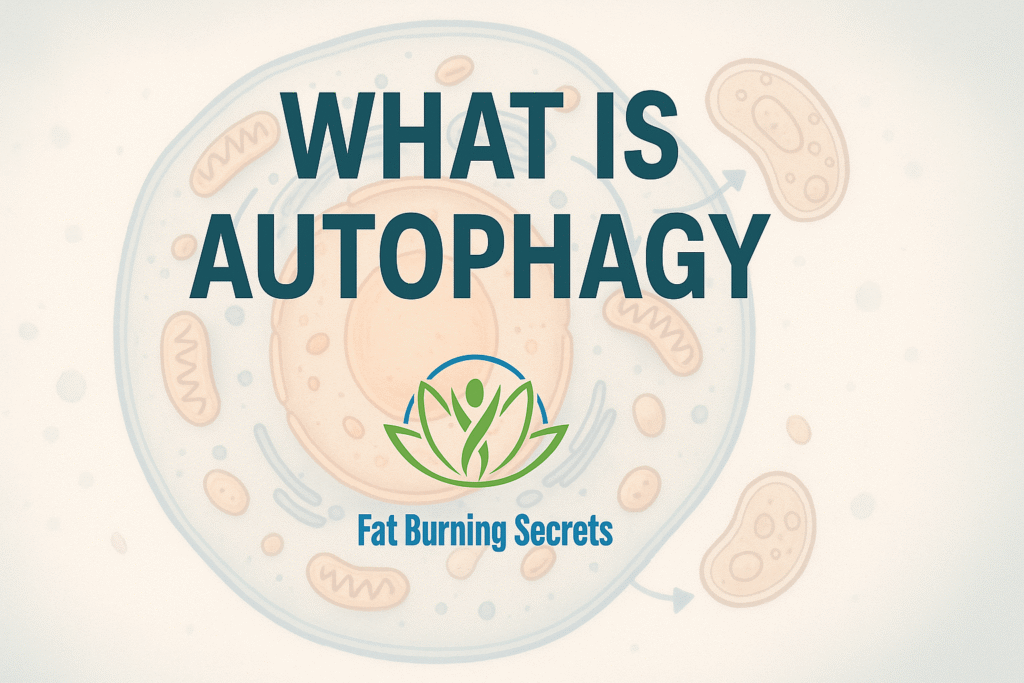
In the ever-evolving world of health and fitness, new concepts and scientific terms are constantly emerging. One such term that has gained significant attention in recent years is autophagy. While it may sound complex, understanding autophagy can empower you to make better decisions about your health, longevity, and overall well-being.
Autophagy is derived from the Greek words ‘auto’ meaning self, and ‘phagein’ meaning to eat. In simple terms, autophagy literally translates to “self-eating.” But don’t let the name alarm you—this process is not harmful. In fact, it’s a natural, essential mechanism that your body uses to maintain cellular health.
Diving Deeper into Autophagy
Autophagy is a self-degradative process that plays a critical role in balancing sources of energy at crucial times, such as during development or periods of nutrient stress. Imagine your body as a highly efficient recycling plant. When cells become damaged, old, or dysfunctional, autophagy kicks in to break down and remove these cellular components. The resulting building blocks—amino acids, fatty acids, and sugars—are then reused to build new, healthy cells and tissues.
This process is not only about cleaning up cellular debris. Autophagy also helps your body adapt to changing conditions, such as fasting or exercise, by reallocating resources and maintaining energy balance. It’s a dynamic, ongoing process that ensures your cells function optimally.
The Science Behind Autophagy
At the cellular level, autophagy involves the formation of double-membraned structures called autophagosomes. These structures engulf damaged organelles, misfolded proteins, and other cellular waste. The autophagosomes then fuse with lysosomes—organelles filled with digestive enzymes—which break down the contents into usable components.
Research has shown that autophagy is highly conserved across species, from yeast to humans, highlighting its fundamental importance in biology. The discovery of key genes involved in autophagy even earned the Nobel Prize in Physiology or Medicine in 2016, underscoring its significance in health and disease.
When Does Autophagy Start?
One of the most common questions about autophagy is: When does it actually begin? The answer isn’t entirely straightforward, as the onset of autophagy depends on various factors, including your diet, activity level, age, and overall metabolic health.
Generally, autophagy is upregulated during periods of nutrient deprivation—most notably during fasting. Scientific studies suggest that autophagy may begin to ramp up after 12-16 hours of fasting, although the exact timing can vary from person to person. For some, autophagy may start sooner, while for others, it may take longer, especially if they have a high carbohydrate intake or are less physically active.
It’s important to note that autophagy is not an all-or-nothing process. Your body is constantly balancing autophagy with other cellular processes, turning it up or down as needed.
The Role of Autophagy in Health and Fitness
Autophagy is much more than just a cellular cleanup crew. It plays a pivotal role in protecting your body from a wide range of diseases and age-related conditions. Here are some of the key benefits:
- Disease Prevention: By removing damaged cells and proteins, autophagy helps prevent the accumulation of cellular debris that can lead to diseases such as cancer, neurodegenerative disorders (like Alzheimer’s and Parkinson’s), cardiomyopathy, diabetes, liver disease, autoimmune conditions, and infections.
- Longevity: Studies in animals have shown that enhanced autophagy is associated with increased lifespan. While research in humans is ongoing, there is growing evidence that supporting autophagy may promote healthy aging.
- Muscle Health: During exercise, autophagy helps remove damaged mitochondria and proteins from muscle cells, supporting recovery and adaptation.
- Immune Function: Autophagy plays a role in eliminating pathogens and supporting immune cell function, helping your body defend against infections.
How Can You Promote Autophagy?
While fasting is the most well-known trigger for autophagy, it’s not the only way to support this vital process. Here are several evidence-based strategies:
1. Intermittent Fasting
Intermittent fasting involves cycling between periods of eating and fasting. Popular methods include the 16:8 (16 hours fasting, 8 hours eating) or 5:2 (eating normally for 5 days, restricting calories for 2 days) approaches. Fasting gives your body a break from constant digestion and allows autophagy to increase.
2. Regular Exercise
Physical activity, especially endurance and high-intensity interval training (HIIT), has been shown to stimulate autophagy in muscle and other tissues. Exercise-induced autophagy helps repair and rejuvenate cells, contributing to better performance and recovery.
3. Balanced Nutrition
A diet rich in antioxidants (found in colorful fruits and vegetables), healthy fats, and lean proteins supports cellular health and may enhance autophagy. Limiting processed foods, excess sugar, and unhealthy fats can also reduce cellular stress and inflammation.
4. Adequate Sleep
Quality sleep is essential for cellular repair and regeneration. Poor sleep can disrupt autophagy and increase the risk of chronic diseases.
5. Stress Management
Chronic stress can impair autophagy. Practices such as meditation, yoga, and deep breathing can help maintain a healthy balance.
Frequently Asked Questions
Q1: How is autophagy determined?
A1: Autophagy is mainly studied in laboratory settings using biomarkers such as LC3 and p62 proteins. In clinical practice, direct measurement is challenging, but researchers use these markers to assess autophagic activity in tissues.
Q2: Can excessive autophagy be harmful?
A2: Yes, while autophagy is generally beneficial, excessive or uncontrolled autophagy can lead to cell death, known as autophagic cell death. Balance is key! Too little autophagy can contribute to disease, while too much can be damaging.
Q3: Is intermittent fasting the only way to initiate autophagy?
A3: No, while fasting is a powerful trigger, regular exercise, proper nutrition, and adequate sleep also play significant roles in promoting autophagy.
Q4: Can supplements boost autophagy?
A4: Some compounds, such as resveratrol (found in red wine) and spermidine (found in wheat germ and soybeans), have been shown in studies to support autophagy. However, more research is needed, and lifestyle factors remain the most effective approach. See my post on What is Spermidine?
Wrapping Up
Autophagy is a fascinating and essential biological process that helps your body stay healthy by removing damaged cells and promoting the growth of new ones. Its role in disease prevention, longevity, and overall cellular health makes it a topic worth understanding and embracing in your daily life.
While fasting is a popular way to boost autophagy, remember that regular exercise, a balanced diet, quality sleep, and stress management are equally important. As with any health strategy, moderation and balance are crucial. If you’re considering significant lifestyle changes, consult with a healthcare professional to ensure they’re appropriate for your individual needs.
Key Takeaways
- Autophagy is your body’s natural self-cleaning process, essential for cellular health and disease prevention.
- Fasting, exercise, nutrition, and sleep all play roles in promoting autophagy.
- Balance is key! Too much or too little autophagy can be harmful.
- For personalized advice, always consult a healthcare professional.
References
- Alirezaei, M., Kemball, C. C., Flynn, C. T., Wood, M. R., Whitton, J. L. (2010). Short-term fasting induces profound neuronal autophagy. Autophagy, 6(6), 702–710. https://doi.org/10.4161/auto.6.6.12376
- He, C., Bassik, M. C., Moresi, V., Sun, K., Wei, Y., Zou, Z., … & Levine, B. (2012). Exercise-induced BCL2-regulated autophagy is required for muscle glucose homeostasis. Nature, 481(7382), 511-515. https://doi.org/10.1038/nature10758
- Klionsky, D. J., Abdelmohsen, K., Abe, A., et al. (2016). Guidelines for the use and interpretation of assays for monitoring autophagy (3rd edition). Autophagy, 12(1), 1-222. https://doi.org/10.1080/15548627.2015.1100356
- Lavandero, S., Chiong, M., Rothermel, B. A., & Hill, J. A. (2015). Autophagy in cardiovascular biology. The Journal of Clinical Investigation, 125(1), 55-64. https://doi.org/10.1172/JCI73943
- Levine, B., & Kroemer, G. (2019). Biological Functions of Autophagy Genes: A Disease Perspective. Cell, 176(1-2), 11-42. https://doi.org/10.1016/j.cell.2018.09.048
- Madeo, F., Zimmermann, A., Maiuri, M. C., & Kroemer, G. (2019). Essential role for autophagy in life span extension. The Journal of Clinical Investigation, 125(1), 85-93. https://doi.org/10.1172/JCI73946
- Menzies, F. M., Fleming, A., & Rubinsztein, D. C. (2017). Compromised autophagy and neurodegenerative diseases. Nature Reviews Neuroscience, 16(6), 345-357. https://doi.org/10.1038/nrn3961
- Mizushima, N., & Komatsu, M. (2011). Autophagy: Renovation of cells and tissues. Cell, 147(4), 728-741. https://doi.org/10.1016/j.cell.2011.10.026
- Mizushima, N., Yamamoto, A., Matsui, M., Yoshimori, T., & Ohsumi, Y. (2004). In vivo analysis of autophagy in response to nutrient starvation using transgenic mice expressing a fluorescent autophagosome marker. Molecular Biology of the Cell, 15(3), 1101-1111. https://doi.org/10.1091/mbc.e03-09-0704
- Nixon, R. A. (2013). The role of autophagy in neurodegenerative disease. Nature Medicine, 19(8), 983-997. https://doi.org/10.1038/nm.3232
- Pallauf, K., Giller, K., Huebbe, P., & Rimbach, G. (2017). Nutrition and healthy ageing: Calorie restriction or polyphenol-rich “MediterrAsian” diet? Oxidative Medicine and Cellular Longevity, 2013, 707421. https://doi.org/10.1155/2013/707421
- Singh, R., Kaushik, S., Wang, Y., et al. (2009). Autophagy regulates lipid metabolism. Nature, 458(7242), 1131-1135. https://doi.org/10.1038/nature07976
- White, E. (2015). The role for autophagy in cancer. The Journal of Clinical Investigation, 125(1), 42-46. https://doi.org/10.1172/JCI73941


